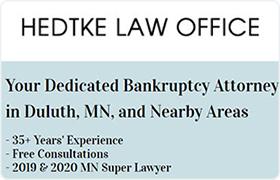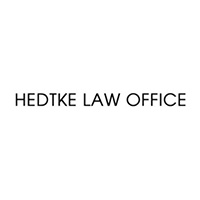Duluth Collection Lawyer, Minnesota
Sponsored Law Firm
-
 x
x

Click For More Info:
-
Hedtke Law Office
1217 E. 1St Street Duluth, MN 55805» view mapBankruptcy & Debt Sensible Debt Solutions
Hedtke Law Office is here to answer your questions and guide you through the bankruptcy process. We work to help you reduce your debt while keeping your personal property.
800-887-8940
Not enough matches for Duluth Collection lawyer.
Below are all Duluth Bankruptcy & Debt lawyers.
Yvonne Michaud Novak
Estate, Consumer Bankruptcy, Limited Liability Companies, Trusts
Status: In Good Standing *Status is reviewed annually. For latest information visit here Licensed: 22 Years
Peter Cosmas Greenlee
Tax, Child Custody, Business Organization, Bankruptcy, Bankruptcy & Debt
Status: In Good Standing *Status is reviewed annually. For latest information visit here
Frederick A Dudderar
Lawsuit & Dispute, Bankruptcy & Debt
Status: In Good Standing *Status is reviewed annually. For latest information visit here Licensed: 44 Years
Timothy Ryan Tripp
Divorce & Family Law, Business, Bankruptcy & Debt
Status: In Good Standing *Status is reviewed annually. For latest information visit here Licensed: 13 Years
John H Bray
Real Estate, Lawsuit & Dispute, Bankruptcy & Debt
Status: In Good Standing *Status is reviewed annually. For latest information visit here Licensed: 35 Years
 John Hedtke Duluth, MN
John Hedtke Duluth, MN Practice AreasExpertise
Practice AreasExpertise